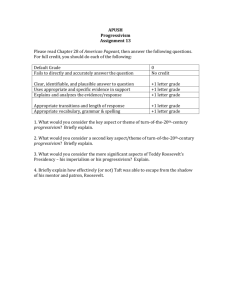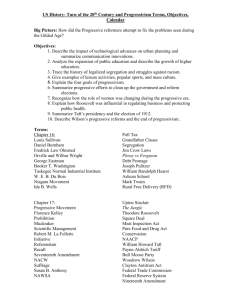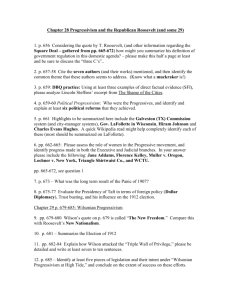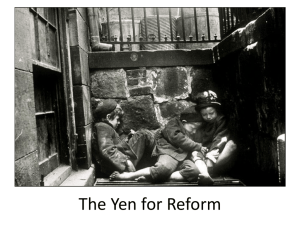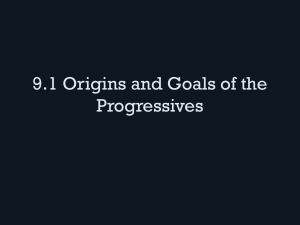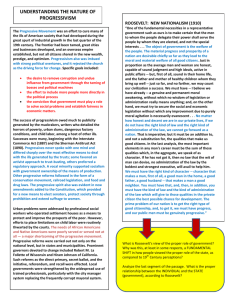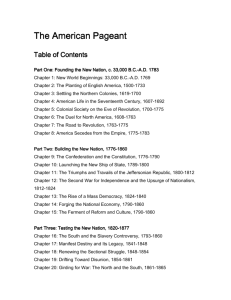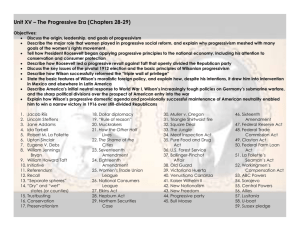Goal 7 Objectives: Rise of Progressivism
advertisement
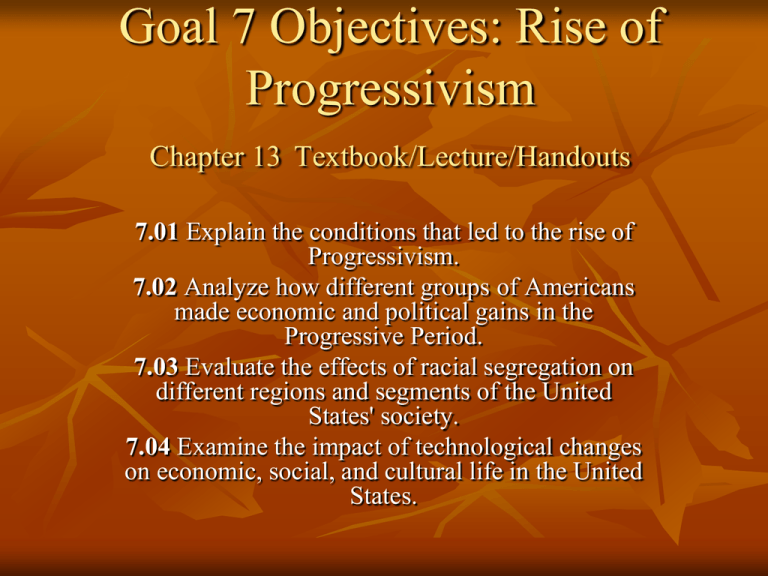
Goal 7 Objectives: Rise of Progressivism Chapter 13 Textbook/Lecture/Handouts 7.01 Explain the conditions that led to the rise of Progressivism. 7.02 Analyze how different groups of Americans made economic and political gains in the Progressive Period. 7.03 Evaluate the effects of racial segregation on different regions and segments of the United States' society. 7.04 Examine the impact of technological changes on economic, social, and cultural life in the United States. What is Progressivism? Progressivism: a time period when people in American began to favor progress toward better conditions in government and society How was Progressivism in conflict with the idea of “individualism” of the Gilded Age? Progressive Era runs from about the late 1890’s to about 1920 Origins of Progressivism While reformers came from all classes and walks of life, what social class was mainly responsible for this social movement? The Progressive Era marks the first time that Americans started thinking that maybe it wasn’t always the “fault” of the poor for their situation. “It is only by a slow and patient inward transformation...laws aid in bringing about that men are really helped upward in their struggle for a higher and fuller life” – Pres. Theodore Roosevelt Origins of Progressivism There is an intimate relation between a bad environment and bad habits; that bad sanitation had not a little to do with bad moral; that bad ventilation and bad cooking are responsible for much drunkenness.” – preacher of the “Social Gospel” What does this quote tell us about Progressivism? Top Progressive Causes: “Social Evils” Prostitution: 1 in 110 women in large cities were prostitutes; $6 week for most factory jobs, $25 a week for prostitution What was the Mann Act? What was it used for most often? • Temperance: Why did this tend to be a woman’s cause? Saloons tended to also be brothels; 1880-1900 number of saloons doubled •Growing divorce rate: started in upper classes, but moved to farms and middle class; “cruelty” became a new ground for divorce Why did this Progressive effort stall for the most part? Other causes…. City officials and corruption (especially in voting; The Reign of Gilt) Who was Boss Tweed? Trust busting and aim at big business and labor conditions (Ida Tarbell, Upton Sinclair *) Minor causes: Paved streets, better drinking water, sanitation, tenement housing reform, trust busting, social welfare, the list goes on…. Big Business From 1897 to 1902: “the great merger movement”, 1,800 companies merged into just 157 (vertical and horizontal integration) Mergers of companies raised price of goods, cut wages for workers and demanded more productivity, manipulated freight charges What was…? Laissez-Faire approach The Progressive Approach (3 things) Some Ways to Reform Society (pgs 420-427) Muckrakers: What did that name mean? Social Gospel: preached salvation through government activism Anti Saloon League type groups or “smashers” Settlement houses (tripled in 20 years) Keating Owens Act: made child labor illegal, overruled in 1838 Worker’s compensation laws 17th Amendment: direct election of Senators 18th Prohibition (repealed in 1833) Galveston Plan: formed local municipal government Women’s colleges Meat Inspection Act/Pure Food and Drug Act: result of “The Jungle” National Consumer League: labeled “goods produced under fair, safe and healthy working conditions National Association of Colored Women 19th Amendment Limits to Progressivism What limited more progress of the Progressive causes? What’s Plessy v. Ferguson (1896) got to do with it? “It is the Southern people themselves who must and can solve the difficulties that exist in the South.” – T Roosevelt W.E.B. Dubois and Booker T. Washington Teddy Roosevelt President: 1901 Charismatic, and not weak, like the string of past Presidents How did Roosevelt feel about Progressives? Big business? Started “Square Deal” “When I say I believe in a square deal, I do not mean to give every man the best hand. If good cards do not come to any man, or if they do come, and he had not got the power to play them, that is his affair. All I mean is that there shall be no crookedness in the dealing.” – T Roosevelt Was he a Trust Buster? Pursuit of Pleasure Baseball went from players who were considered “bums” to a “gentlemen’s game” and the most popular sport in America Vaudeville, Ragtime and jazz music Silent movies Freud, movies, birth control debate, and attention to prostitution all made sexuality more open** Essential Questions 1. 2. 3. How did the conditions of the Gilded Age help the causes of the Progressives? What tactics were most effective in bringing about reforms? Why did these work more than others? Does society cause government to change or does government cause society to change?
